
Our History
Over 165 years of helping customers 'make houses feel like homes'
Fairway Furniture is one of the oldest furniture retailers in the UK, tracing its history back over 169 years to early 1856 in Plymouth. It's story is one of hard work, dealing with adversity and seizing new opportunities. The below short film and the sections below it detail how one John Harding's dream went on to become a long-lasting legacy, which to this day remains owned and run by his descendent family.
1856-1860: The beginning of the story
The original John Harding (seen here in the centre of the photgraph) first entered business in Plymouth in 1856 when he and his son John Harding Junior started ‘J Harding & Sons’. At that time they not only sold furniture which they themselves had produced but were also undertakers, general brokers and timber dealers.
The inclusion of undertaking in the scope of the business was not unusual in the furniture industry, as many of the skills needed were common to those required to make furniture, in particular cabinets. Many well established furniture retailers and manufacturers have at some time in their history had at least some involvement in undertaking.
1860-1900: Growth and consolidation
After only four years of trading, John Harding Junior temporarily left the business as he joined others from
In the mid 1860's John Junior instigated a change to the company's name to ‘Harding & Sons’, followed by a move from the original premises in Devonshire Terrace to Union Street. At this stage, the nature of the business had changed, with the cessation of the timber merchant business and the introduction of upholstery and bedding to the range of products being manufactured and sold.
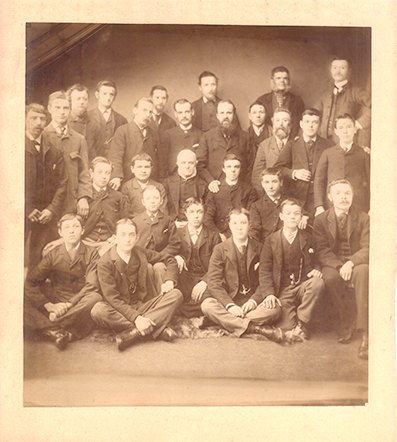
1900-1929: Evolution of the business
John Junior married Sarah and between them had five children, Albert Henry, John III and three daughters. John III was the eldest, and perhaps not surprisingly joined his father in working in the business, which he would continue to do for many years. However, it was Albert Henry Harding who was destined to take over from his father, which he did in 1900 at the age of 21.
By 1899, the business had consolidated back to occupy only
Following his arrival in the business Albert, who it would appear represented somewhat of a ‘revolutionary’ generation of the Harding family, set about putting his unique brand of retailing into practice. However, in the early days of his involvement it was still the custom for the workmen to come out of the back-room workshops to act as salesmen. In an article featured in the furniture trade paper 'Cabinet Maker' many years later, Albert said that the workmen were very good salesmen, for being practical men they could answer any questions about the finished furniture or indeed take details from customers and then make something to order.
1929-1939: The build-up to war
Relatively unaffected by World War I, the company grew steadily. The company was officially incorporated as a private limited company in 1929. To this day, the company still remains a private limited company under the name ‘Harding & Sons Ltd’, although it now adopts the trading name ‘Fairway Furniture’.
In 1932 Albert Harding saw the need to expand the business and improve presentational standards, so the premises were gutted and an extensive modernisation carried out, including a new frontage and the construction of 14 fully enclosed showrooms in an arcade style setting. Indeed, an advert from the Western Morning News in 1936 proudly proclaimed the new premises as ‘Plymouth's Brightest Furnishing Spot’ with 200 feet of ‘furnishing arcades’.
In 1936, to assist customers in making their choice the company introduced its first catalogue, which contained over 200 illustrations of the different pieces available. The catalogue outlined Harding & Sons ‘easy payment terms’ where customers could purchase furniture with anything up to 3 years credit on amounts from £5 to £100.
By the late 1930s, the first rumblings of war had started, but the company continued to trade successfully, with Albert's son William Harding now approaching the age when he would be looking to join the company.
1939-1946: The war years
During one of the 1940 bombing raids carried out by the Luftwaffe on Plymouth (because of the presence of the Royal Dockyard it was a very important military city) the premises in Union Street were completely destroyed. William was given compassionate leave from his RAF posting in order for him to return to
During the company's time trading from temporary premises, it sold mainly second-hand products due to the severe shortages of new merchandise caused by the war.
William Harding returned home again briefly in October 1945 so that he could marry Joan Oliver whom he had met years previously. Joan had been working for the Civil Service for several years, but on the 1st January 1946 she left to join Harding & Sons.
As the company emerged from the war, it had made 6 years of losses, so the pressure was intense on the relatively inexperienced William to revive the fortunes of the company.
1946-1976: Rebuilding and consolidation
Immediately following the war, as one might expect, furniture was subject to a form of rationing. Priority was given to those who had been bombed out and newly-weds who were looking to set-up home. Virtually all the furniture supplied during this time was termed ‘utility’ furniture and was often very crude in construction, designed to be functional while also making effective use of the limited resources available at the time.
As the company gradually got back on its feet, the government moved to compensate retailers and other businesses through a programme of War Damage payments. Harding & Sons Ltd applied and when it was finally made, the company received £40,000 towards the cost of a new building and the job of re- establishing the business began.
As the process of reconstruction of Plymouth city centre began, the city council offered all those who had been bombed-out new sites within the new, planned city centre. Harding & Sons Ltd was offered a site in Old Town Street, a site which has now been enveloped by the Drake’s Circus shopping centre.
In order that the company could build its new premises, it had to borrow a further £60,000 in addition to the £40,000 compensation already received. When it was finally finished in March 1953 the premises provided superb new surroundings to retail household furniture.
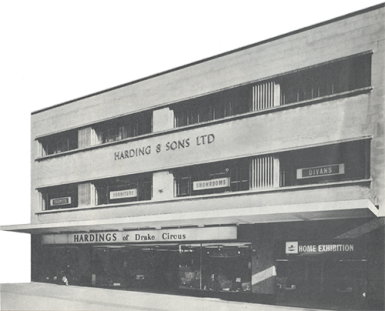
1976 - 1995: The big break
The company traded successfully from the Drakes Circus site for 25 years, providing a wide range of quality furniture, carpets and beds. However, in the early 1970's, William’s son, John Harding joined the company. This was a period of rapid change within the business and the new ideas John brought with him began a revolution in furniture retailing. He identified that having stores located in city centres presented many problems, and that the obvious move was to ‘out-of-town’ sites, where you could provide customers with wider choice and free car-parking.
After much searching for a suitable site, a site on Plymouth Road in Tavistock was purchased. Extensive conversion and building work was carried out to make the building suitable to use, and in 1976, the first ‘Fairway Furniture’ store opened.
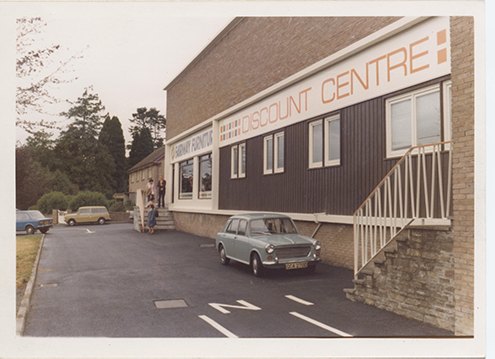
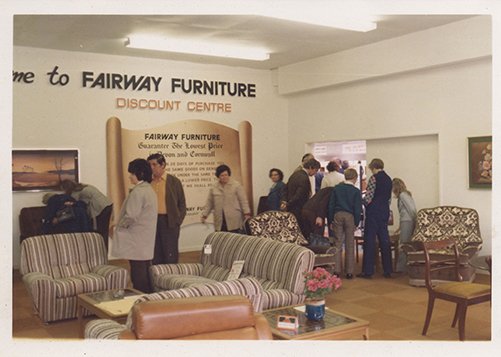
While that store sought to establish itself in the market, the Harding & Sons store continued to trade in Plymouth until the early 1980's, when the store was sold and the company purchased land in Newton Abbot on which to site the second Fairway store.
When that store opened in 1981, the company immediately began trying to acquire a suitable site in Plymouth for the next and ultimately biggest store, accompanied by a new Head Office. In 1984 the company proudly unveiled its "flagship" store, some 24,000 square feet in size.
As the company grew, so the level of staff increased to keep pace. From an original staff of 20 during the days in Drakes Circus, to 75 in 1985, the company became a major retail employer in the South West. In 1989 the St Austell store opened, giving Fairway a centrally located site in Cornwall which opened up a previously peripheral market, and took overall staff levels to just under 100.
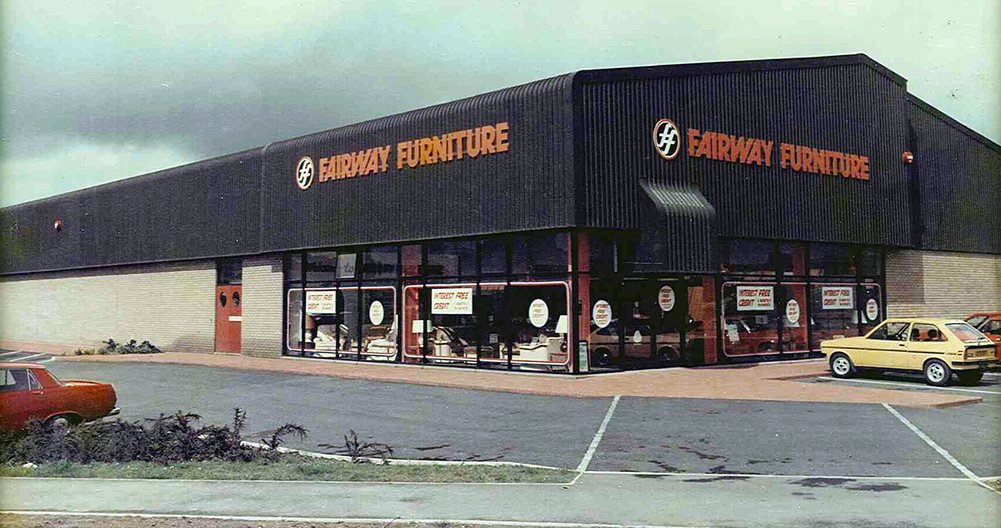
1995 - 2006: The sixth generation
In the autumn of 1995, Peter Harding joined his father John into the business
In 1999, the company purchased a site at Lee Mill and the Plymouth store’s warehouse relocated there in the spring of that year. Later, having established the distribution centre, the Newton Abbot warehouse was also closed and deliveries for that store moved to being run from Lee Mill.
This new facility enabled the company to better handle customer orders, and also to start buying stock to offer customers a wider choice at better prices.
Celebrations to mark ‘Harding & Sons Ltd’s’ 150th birthday in 2006 included a gala dinner at St Mellion Golf & Country Club near Plymouth.
2009 - 2025: Looking to the future
Through the ‘Credit Crunch’ of 2007/2008 the company suffered from weak consumer confidence. This led to further consolidation of the company’s distribution activities in the summer of 2012 with the closure of the Tavistock store’s warehouse and the transfer of its work to the Lee Mill Distribution Centre.
In July 2012, John Harding retired after over 40 years in the business. The Company continues to look at expansion in to new areas of the South West and beyond. As one of the oldest furniture retail companies in the country however, taking time to find the right locations is something which comes naturally......






